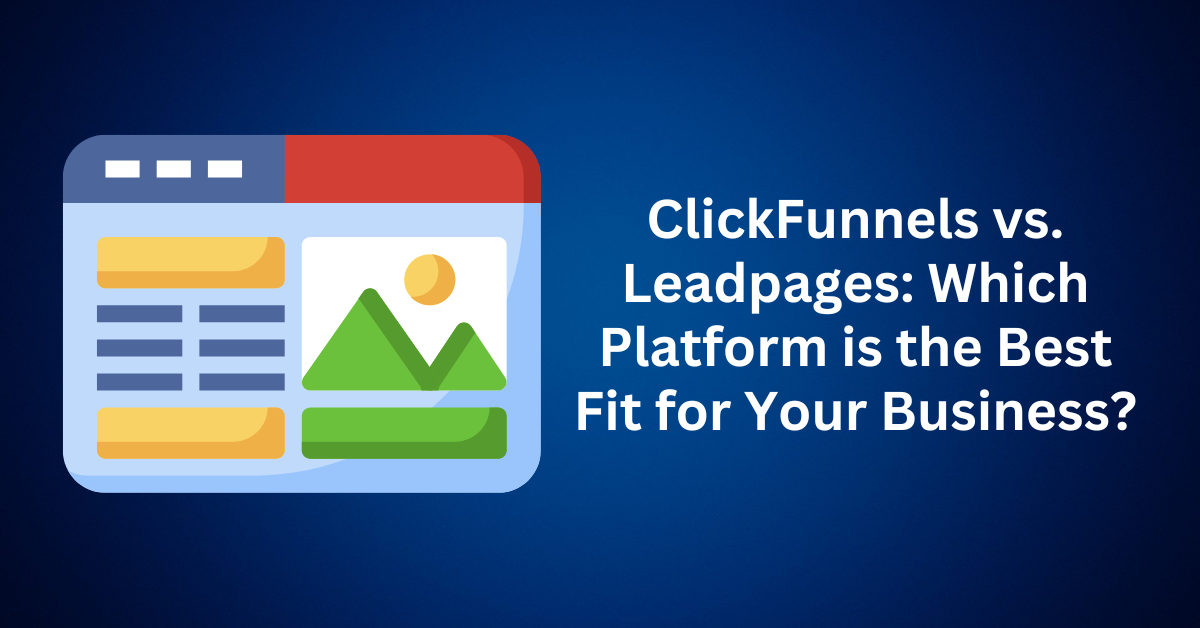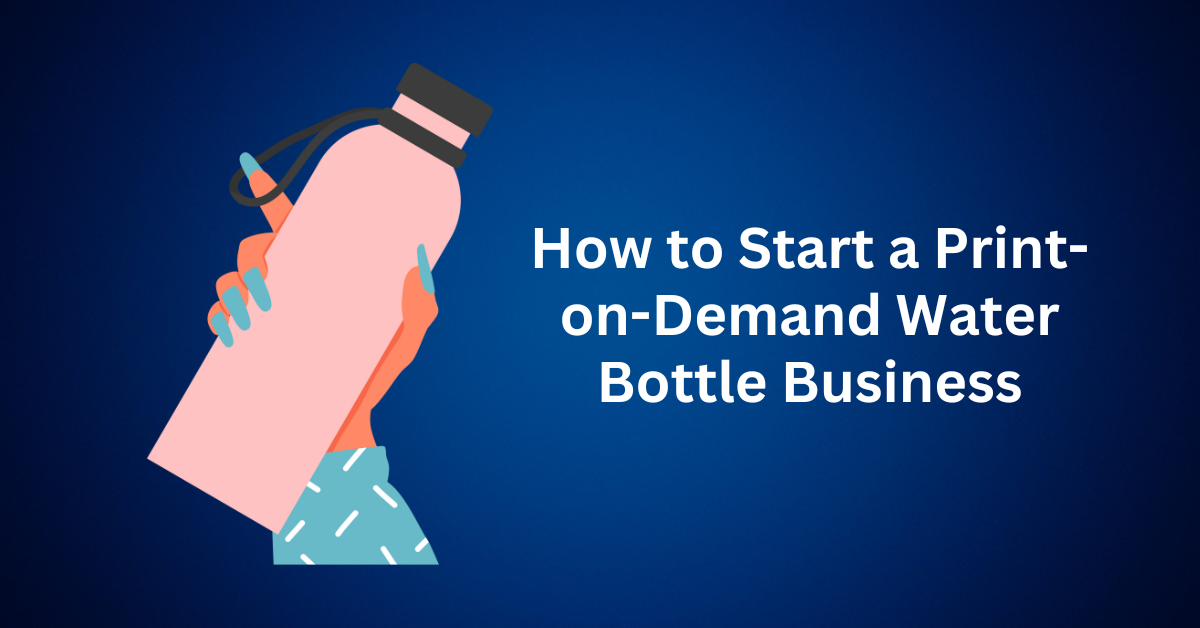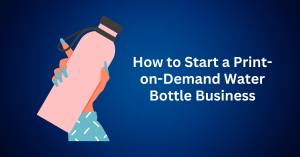Choosing the right marketing tool can feel overwhelming. With so many platforms promising higher conversions, seamless integrations, and ease of use, it’s easy to make a quick decision you later regret. Months down the road, you might find that the service you picked doesn’t scale with your business, doesn’t integrate with your favorite tools, or simply doesn’t give you the features you need. That frustration can cost you time, money, and momentum. To save you from that headache, we’re diving into an honest comparison of two of the most popular tools in the digital marketing space: ClickFunnels vs. Leadpages.
Both platforms have carved out strong reputations for helping entrepreneurs, small business owners, and marketers capture leads and drive conversions. The difference lies in what they are designed to do best — and that distinction is critical when choosing the tool that will support your growth.
Table of Contents
ToggleThe Core Difference: Funnels vs. Pages
At first glance, ClickFunnels and Leadpages might seem interchangeable. After all, both are designed to help you turn traffic into leads or customers. But here’s the key distinction:
- Leadpages is primarily a landing page builder. It allows you to create single, conversion-focused pages quickly and affordably.
- ClickFunnels, on the other hand, is a sales funnel builder. It lets you design an entire journey — a sequence of pages and steps that guide a prospect from initial interest to becoming a paying customer.
This difference shapes everything else about the two platforms, from pricing to features to the type of businesses they serve best.
Landing Page vs. Sales Funnel: What’s the Difference?
Before we compare features, let’s clarify what a landing page and a sales funnel actually are.
- Landing Page: A standalone page designed with one goal — usually capturing leads or making a single offer. For example, a Leadpages landing page might promote an ebook, webinar signup, or a simple product purchase.
- Sales Funnel: A series of connected pages and steps that build trust and guide users toward a purchase. ClickFunnels makes it easy to design funnels such as:
- Squeeze Page Funnel – A simple funnel for collecting email addresses and growing your list.
- Application Funnel – Perfect for service providers or coaches who need to pre-qualify leads through an application process.
- Tripwire Funnel – A funnel designed to convert cold or warm leads into customers through a low-ticket “entry product.”
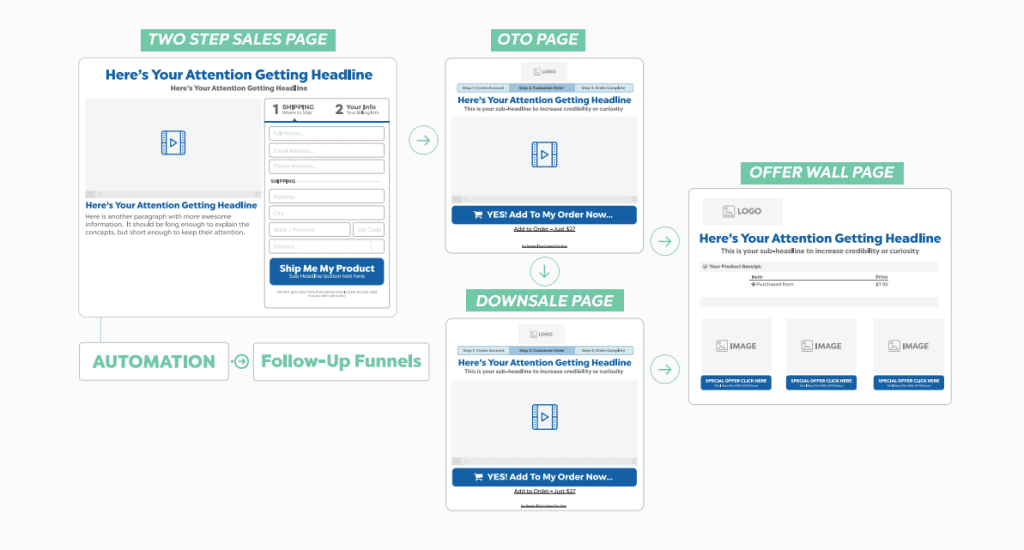
Think of it this way: a landing page is a door, while a sales funnel is the entire hallway that leads visitors deeper into your business.
Which Is Better: A Landing Page or a Full Sales Funnel?
The honest answer is that both can work, depending on your business model and goals.
- If you only need a single page to collect leads or promote a one-off product, Leadpages might be enough.
- If you’re looking to design a more complete customer journey — nurturing prospects through multiple stages — ClickFunnels is built for that purpose.
At ClickFunnels, we’ve consistently seen that funnels outperform single landing pages in terms of conversion rates. By walking prospects through a series of tailored steps, you remove friction, build trust, and maximize revenue potential.
That said, many businesses do just fine with Leadpages, especially if their strategy is simple and their budget is smaller. The decision ultimately depends on your goals, your budget, and how much complexity your marketing requires.
Features: Does ClickFunnels or Leadpages Have What You’ll Need Long-Term?
When comparing ClickFunnels vs. Leadpages, one of the most important considerations is scalability. It’s not just about what you need today — it’s about whether the platform you choose will still serve your business six months, one year, or even six years down the road.
Let’s start with what ClickFunnels brings to the table.
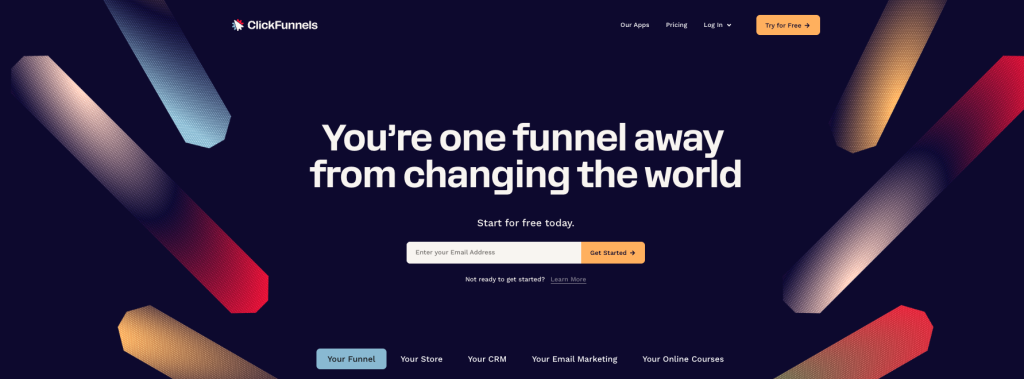
ClickFunnels Features
ClickFunnels is built to be more than just a landing page builder. It’s designed as a complete marketing and sales system. Here are the standout features that make it a powerful all-in-one solution:
1. Drag-and-Drop Funnel Builder
With ClickFunnels, funnel creation becomes simple thanks to its intuitive drag-and-drop editor. In just a few clicks, you can design each page in your funnel—from opt-ins to thank-you pages—without ever touching a line of code. As a result, you can stay focused on strategy and conversions, rather than wasting time on design headaches.
2. Built-In Website Hosting
Unlike Leadpages, which focuses only on landing pages, ClickFunnels provides full website hosting for your funnels. You can register a new domain directly within your account or connect an existing one, making it easy to centralize your entire online sales system in one place.
3. Professional Funnel Templates
If you don’t want to start from scratch, ClickFunnels offers a large library of pre-built funnel templates. Whether you’re selling products, running webinars, or generating leads, you’ll find a template designed to maximize conversions.
4. A/B Split Testing
Serious marketers know that optimization is key. ClickFunnels includes built-in split testing so you can test headlines, layouts, and offers. With real-time performance data, you’ll know exactly what’s driving the best results.
5. Conversion Tracking & Analytics
In addition to easy funnel building, ClickFunnels gives you access to detailed stats for every funnel. With just a glance, you can see metrics like earnings per click (EPC), average cart value, and conversion percentages. Because of this, you’re able to make data-driven decisions that help you optimize performance and scale your business more effectively.
6. Email Automation (Built-In Autoresponder)
Another major advantage of ClickFunnels is its integrated email marketing automation. With this feature, you can build follow-up sequences, nurture leads, and send promotional campaigns—all without relying on third-party software. However, if you prefer your existing email provider, no problem. In fact, ClickFunnels integrates seamlessly with popular tools like Mailchimp, ActiveCampaign, and many more.
7. Membership Site Functionality
Want to create a subscription-based business or online course? ClickFunnels allows you to build secure membership sites directly inside the platform, making it easy to deliver exclusive content to paying members.
8. Integrated Shopping Cart & Checkout
With ClickFunnels, you don’t need an additional eCommerce platform. That’s because its built-in shopping cart and checkout system lets customers add products to their cart, complete transactions, and even purchase upsells—all without ever leaving your funnel. As a result, you can streamline the buying process and maximize sales in one seamless system.
Why These Features Matter
The reason ClickFunnels is often chosen over Leadpages is that it’s future-proof. Instead of piecing together multiple services for landing pages, hosting, email marketing, analytics, and shopping cart functionality, ClickFunnels bundles everything into one platform.
This all-in-one approach saves time, reduces tech headaches, and ensures that as your business grows, your marketing system can grow with you.
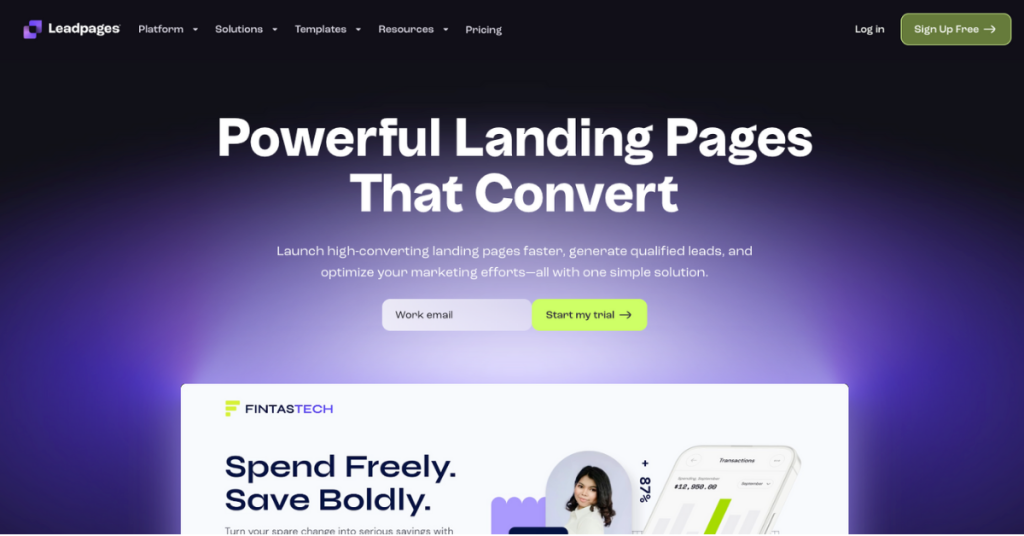
Leadpages Features
While ClickFunnels positions itself as an all-in-one sales funnel platform, Leadpages shines as a dedicated landing page builder with a focus on simplicity, speed, and affordability. If your main goal is to create professional landing pages that convert, Leadpages is a strong contender. Let’s look at the key features it offers:
1. Drag-and-Drop Page Builder
Leadpages gives users a drag-and-drop visual editor that makes it easy to design custom landing pages without coding. While the editor is slightly more restrictive than ClickFunnels in terms of widget placement, it’s beginner-friendly and allows you to get pages live quickly.
2. Unlimited Page Publishing (with Plan Limits)
One of Leadpages’ big selling points is that you can create and publish unlimited landing pages. However, the publishing limits are tied to your subscription plan:
- Standard Plan: 1 site
- Pro Plan: 3 sites
- Advanced Plan: Up to 50 sites
This makes Leadpages flexible for businesses of different sizes, but it’s worth noting that your landing pages can only be published on sites connected to your account.
3. Exit-Intent Pop-Ups
Leadpages includes an exit-intent pop-up tool to help capture visitors before they leave your site. This is a proven way to increase conversions, whether you’re offering a discount, a lead magnet, or a last-chance call-to-action.
4. A/B Split Testing
Similar to ClickFunnels, Leadpages also includes built-in A/B testing. With this feature, you can test different headlines, images, or CTAs to see which version resonates most with your audience. As a result, you can fine-tune your landing pages with confidence and optimize them for maximum conversions.
5. Countdown Timers
Urgency drives action, and Leadpages makes it easy to add countdown timers to your landing pages. Whether you’re running a limited-time sale, a webinar signup, or a special promotion, this widget can help boost conversions.
6. Domain Hosting
With Leadpages, you can host your landing pages for free on a Leadpages subdomain (e.g., yourbrand.leadpages.co). You also have the option to connect your own custom domain. However, unlike ClickFunnels, you can’t register a new domain directly through Leadpages.
7. Built-In SEO Tools
Leadpages offers a simple but effective SEO editor inside the page builder. You can easily edit your title tags and meta descriptions to improve your chances of ranking in search engines. While this isn’t as advanced as a full SEO platform, it’s a handy feature for small businesses that want to maximize organic traffic.
Why Leadpages Appeals to Many Businesses
The biggest strength of Leadpages is its simplicity and affordability. It’s designed for entrepreneurs, small business owners, and marketers who want to launch landing pages quickly without paying for a full suite of marketing tools.
Unlike ClickFunnels, Leadpages doesn’t try to replace your email software, CRM, or eCommerce system. Instead, it integrates smoothly with those tools while keeping the landing page creation process lightweight and user-friendly.
Integrations: How Do ClickFunnels and Leadpages Connect With Your Tech Stack?
When choosing between ClickFunnels vs. Leadpages, integrations are one of the most important factors to consider. Your business is likely already using email marketing tools, CRMs, payment gateways, or scheduling apps. The last thing you want is to commit to a platform that doesn’t integrate with the software you rely on today — or the tools you might need a year from now.
While neither ClickFunnels nor Leadpages lists every possible integration publicly, both offer a strong lineup of popular connections that cover most business needs. Let’s break them down.
ClickFunnels Integrations
ClickFunnels is built to function as an all-in-one marketing ecosystem, but it also integrates with a wide range of third-party tools. Here are some of the most notable:
- Twilio – Send personalized SMS campaigns and automated text messages.
- Calendar Apps – Embed calendar tools directly into your funnels so leads can self-schedule appointments.
- YouZign – Host and share custom images created in YouZign inside your funnels.
- VWO Engage – Enable push notifications to re-engage funnel visitors.
- Salesforce – Sync your leads and customer data with Salesforce’s CRM.
- Warrior Plus – Sell digital products from Warrior Plus directly through ClickFunnels.
- Disc Delivered – Automate physical product fulfillment.
- Stripe – Accept payments, process orders, and issue receipts seamlessly.
- Kajabi – Connect funnels with Kajabi membership areas for course or content delivery.
- PayPal – Add PayPal payment buttons to your funnel checkout.
- Shopify – Sync products and data between Shopify and your ClickFunnels account.
- Slybroadcast – Send voicemail drops to subscribers from inside ClickFunnels.
- ShipStation – Automate shipping and fulfillment for physical products.
- Zapier – Connect ClickFunnels to thousands of other apps and services.
- ZenDirect – Trigger physical mailings and item shipments directly from funnels.
With this wide variety, ClickFunnels makes it possible to centralize most of your marketing and sales operations without sacrificing flexibility.
Leadpages Integrations
Leadpages doesn’t try to replace your existing marketing stack. Instead, it’s built to plug into the tools you’re already using. While the list of integrations is shorter than ClickFunnels, it covers the essentials most small businesses need:
- Google Analytics – Track and analyze landing page performance.
- Infusionsoft (Keap) – Sync Leadpages data with Infusionsoft’s CRM.
- Zapier – Expand integrations to thousands of additional tools.
- Shopify – Connect landing pages to your Shopify store.
- ActiveCampaign – Send leads directly into your ActiveCampaign account for automation.
- Mailchimp – Collect subscribers and connect with Mailchimp for email campaigns.
- LiveChat – Add live chat functionality to capture leads in real-time.
- HubSpot – Integrate with HubSpot’s CRM to manage contacts and workflows.
- PayPal – Accept PayPal payments directly on Leadpages pages.
- Stripe – Accept payments securely through Stripe.
- Calendly – Add scheduling options for leads via Calendly integration.
Leadpages is ideal for businesses that already have an email marketing platform or CRM in place and just need a landing page tool that plays nicely with those services.
Which Platform Wins on Integrations?
- ClickFunnels offers deeper eCommerce, automation, and fulfillment integrations, making it a better fit for businesses that want an all-in-one system.
- Leadpages focuses on simplicity and core marketing connections, which is perfect for entrepreneurs and small teams that want to keep using their favorite marketing tools without overwhelming complexity.
If your business depends heavily on advanced workflows, automated fulfillment, or selling multiple products, ClickFunnels gives you the flexibility you’ll need long-term. But if your priority is quick, simple landing page integrations with popular email and CRM platforms, Leadpages will be more than enough.
Pricing: ClickFunnels vs. Leadpages
When it comes to cost, both platforms make it easy to get started with a 14-day free trial. That means you can test-drive ClickFunnels and Leadpages before committing — a smart move if you’re unsure which will fit your business best.
But once the trial ends and it’s time to invest, the pricing structure and value you get from each platform look very different.
ClickFunnels Pricing
- Startup Plan – $81/month
- Pro Plan – $248/month
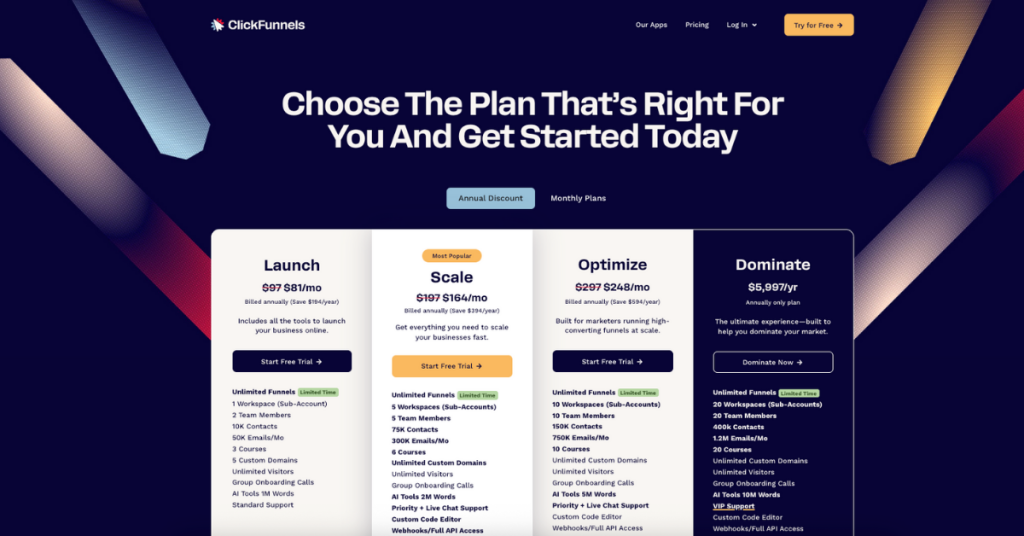
While it’s true that the entry price is higher than Leadpages, ClickFunnels provides a complete sales funnel solution. In one platform, you’ll find funnel templates, landing pages, opt-in forms, payment processing, shopping cart functionality, membership sites, analytics, and even domain registration—all bundled together.
Therefore, for businesses that want to consolidate multiple tools into a single system, the higher monthly fee often pays for itself through reduced tech costs and improved efficiency.
Leadpages Pricing
- Standard Plan – $37/month
- Pro Plan – $74/month
- Advanced Plan – Custom pricing for larger teams and agencies
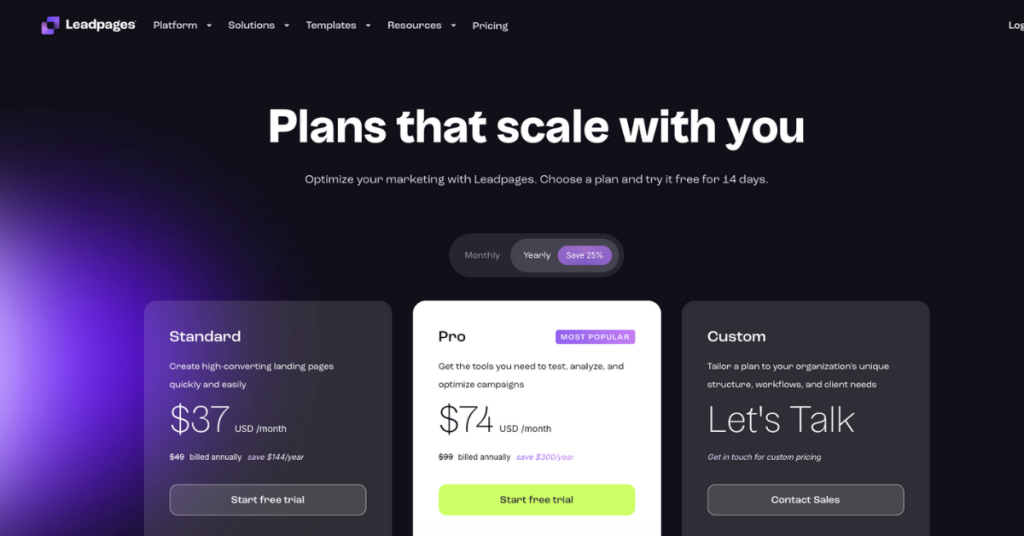
Leadpages is more affordable upfront, especially for entrepreneurs or small businesses. Its pricing reflects its narrower focus: building unlimited landing pages, pop-ups, and alert bars. However, it doesn’t replace other tools like email marketing software, CRMs, or shopping carts. You’ll likely need additional subscriptions to build a complete marketing system.
Value for Money: What Are You Really Paying For?
Here’s the trade-off:
- ClickFunnels is a higher investment but gives you an all-in-one sales and marketing platform that can replace multiple tools. If you’re looking to create full sales funnels and scale with advanced features, it’s built for you.
- Leadpages is more budget-friendly and ideal if you just need a landing page builder that integrates with your existing marketing stack.
In other words:
- If you want another landing page to add to your current website → Leadpages is enough.
- If you want an entire funnel that guides prospects from first click to final purchase → ClickFunnels is worth the extra investment.
Pros and Cons
If you just want the quick takeaway, here’s a side-by-side look at where ClickFunnels and Leadpages shine — and where they fall short.
ClickFunnels – Pros
- Complete sales funnels — ClickFunnels doesn’t just build pages; it builds entire funnels that walk prospects from curiosity to conversion.
- All-in-one platform — From domains and landing pages to email list management, payment processing, and memberships, most businesses can run everything under one roof. And if something’s missing, integrations usually cover the gap.
- High-converting and beginner-friendly — Funnels are designed to perform, and the drag-and-drop builder makes setup simple, even if you’ve never coded a line in your life.
ClickFunnels – Cons
- Higher price tag — Compared to Leadpages, ClickFunnels is more expensive. But you’re also paying for more functionality — the difference often comes down to whether you need a full funnel system or just a single page builder.
Leadpages – Pros
- Landing page focus — If your only goal is to spin up professional-looking landing pages quickly, Leadpages is streamlined for exactly that.
- Lower cost — Because it focuses on pages (and not entire funnels), Leadpages is much lighter on your budget.
- Easy to use — With its drag-and-drop editor, building and publishing a page is quick and doesn’t require technical skills.
Leadpages – Cons
- Limited scope — Leadpages stops at landing pages. It doesn’t create end-to-end funnels or manage the full customer journey. That can be fine if you’re just adding pages to an existing website, but limiting if you want to centralize everything in one platform.
The bottom line: Choose ClickFunnels if you want the power of full funnels. Choose Leadpages if you only need landing pages at a lower cost.
Final Thoughts: ClickFunnels vs. Leadpages: Which Should You Use?
So, which is better — ClickFunnels or Leadpages?
The truth is, it all comes down to what your business really needs.
For instance, if you want a simple, budget-friendly way to launch landing pages, Leadpages will do the job well. On the other hand, if you’re looking for a complete sales funnel system that guides visitors from the first click to the final purchase, ClickFunnels is the stronger choice.
To put it another way, Leadpages is like a sharp tool for a specific task, while ClickFunnels is a full toolbox for building out your entire customer journey.
Ultimately, both platforms are designed to help you capture leads and grow your business. Therefore, the right choice depends on whether you need just a landing page… or a funnel that does the heavy lifting for you.
Whichever option you choose, here’s to building a system that works for your business and helps you convert more customers with less stress.

